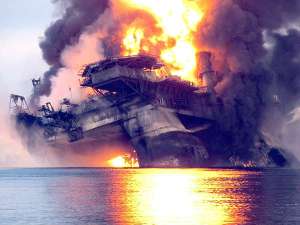
McClatchy-Tribune
Federal investigators from the Bureau of Ocean Energy Resource Management and Enforcement (BOERME) finally issued their long-delayed report today on the causes of last year’s Deepwater Horizon blowout and oil spill. The results are not very surprising: BP, and to a lesser extent contractors like Transocean and Halliburton, made plenty of avoidable mistakes on the way to an accident that killed 11 crew members and led to the biggest oil spill in U.S. history.
From the report:
The loss of life at the Macondo site on April 20, 2010, and the subsequent pollution of the Gulf of Mexico through the summer of 2010 were the result of poor risk management, last-minute changes to plans, failure to observe and respond to critical indicators, inadequate well control response, and insufficient emergency bridge response training by companies and individuals responsible for drilling at the Macondo well and for the operation of the Deepwater Horizon.
The BOERME report is the most exhaustive of the number of investigations launched in the wake of the oil spill, but the findings don’t differ much from the conclusions of an earlier Presidential commission on the accident. The investigators note that BP—ultimately responsible for what happened on Deepwater Horizon—should have kept closer supervision over operations, including lack of maintenance on the rig, a poor cement job on the well and the blowout preventer that did not prevent the blowout.
More from TIME: The Gulf Disaster
Here’s a list of the federal regulation violations that helped lead to the Deepwater Horizon disaster:
BP failed to protect health, safety, property, and the environment by (1) performing all operations in a safe and workmanlike manner; and (2) maintaining all equipment and work areas in a safe condition.
BP, Transocean, and Halliburton (Sperry Sun) failed to take measures to prevent the unauthorized release of hydrocarbons into the Gulf of Mexico and creating conditions that posed unreasonable risk to public health, life, property, aquatic life, wildlife, recreation, navigation, commercial fishing, or other uses of the ocean
BP, Transocean, and Halliburton (Sperry Sun) failed to take necessary precautions to keep the well under control at all times.
BP and Halliburton failed to cement the well in a manner that would properly control formation pressures and fluids and prevent the release of fluids from any stratum through the wellbore into offshore waters.
BP failed to use pressure integrity test and related hole‐behaviour observations, such as pore pressure test results, gas‐cut drilling fluid, and well kicks to adjust the drilling fluid program and the setting depth of the next casing string.
BP and Transocean failed to conduct major inspections of all BOP stack components.
BP failed to perform the negative test procedures detailed in an application for a permit to modify its plans.
For its part, BP has said that it generally agrees with the conclusions of the report—while encouraging “other parties to acknowledge their roles in the accident and make changes to help prevent similar accidents in the future.” No immediate response from Halliburton—though it did file a lawsuit against BP over the accident earlier this month, so I’m guessing feelings are still a little raw.
More from TIME: The Big Spill
The BOERME report includes dozens of recommendations for new ways to improve safety in offshore drilling, including measures that would strengthen blowout prevents and would require operators to more frequently report well-control problems. (Those aboard Deepwater Horizon knew that the Macondo well—the “well from hell“—had serious problems well before the blowout.) We’ll see how many of those recommendations actually get implemented, however. Worried about jobs and the 2012 elections, the Obama Administration has shown little stomach for strengthening regulations recently, while Republicans and oil-state Democrats are pushing hard to liberalize drilling.
But the problems with offshore drilling go well beyond what regulations are or aren’t on the books. As the BOERME’s own report shows, BP and its contractors broke a number of existing regulations. Drilling will only get safer if rules are actually enforced, not just proposed—but here’s not much reason to expect that will happen either. As Peter Maas points out in a new essay on the oil spill in the New York Review of Books, there’s a revolving door between industry and regulators in drilling (as in many other business sectors in America) and little evidence that Americans are willing to pay the price for meaningful regulation:
We have been warned, but will there be real reform? Will the revolving door between industry and regulators be shut? Unfortunately, it’s hard to imagine President Obama, who supports more drilling in America, enacting the thorough changes his committee recommends. This is not an era in which lots of government jobs are being created to increase the regulation of an industry that, though unpopular with environmentalists, counts a large number of Americans as employees and shareholders.
It’s worth nothing that J. David Dykes, the lead investigator on the BOEMRE report, just ended his 12-year government career. His new job: Chevron.
More from Ecocentric: An Oily Mess in the Niger Delta
Bryan Walsh is a senior writer at TIME. Find him on Twitter at @bryanrwalsh. You can also continue the discussion on TIME’s Facebook page and on Twitter at @TIME


